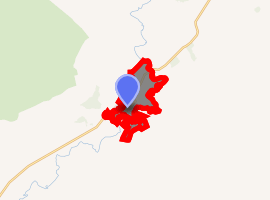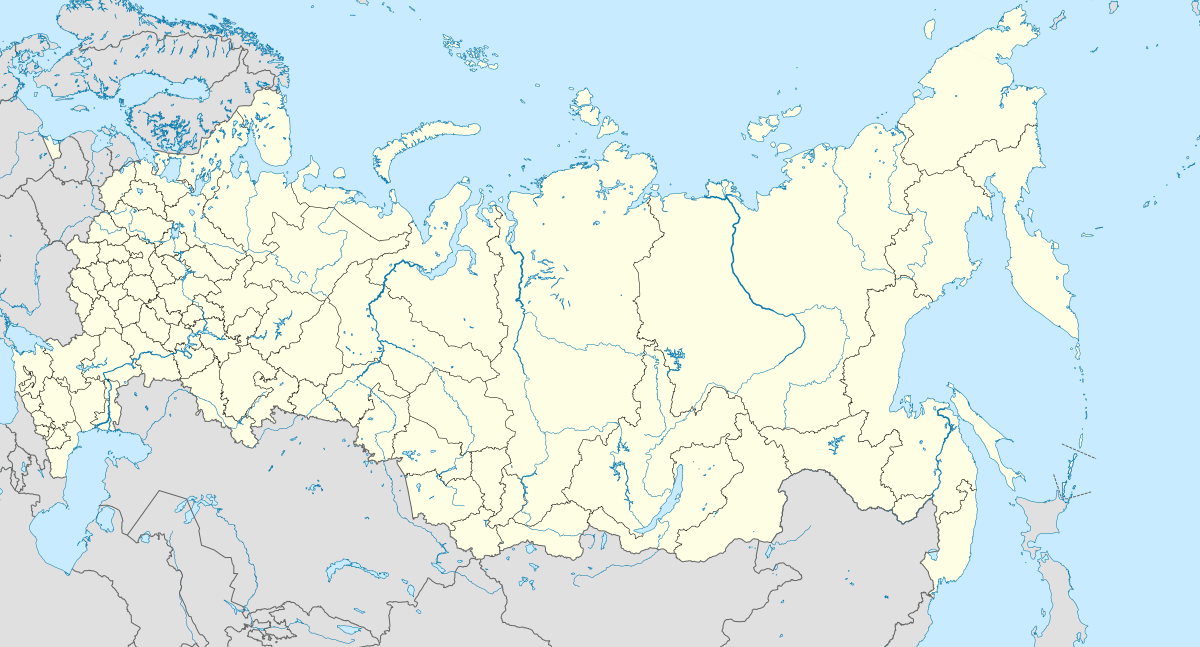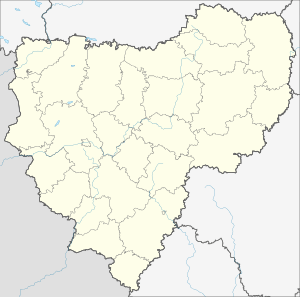Khislavichi
Khislavichi (Russian: Хиславичи, Yiddish: חאסלאוויץ Khoslovitz) is an urban locality (an urban-type settlement) and the administrative center of Khislavichsky District of Smolensk Oblast, Russia, located by the right bank of the Sozh River. Population: 4,138 (2010 Census);[3] 4,617 (2002 Census);[9] 5,013 (1989 Census).[10]
Khislavichi Хиславичи | |
|---|---|
Settlement[1] | |
Location of Khislavichi 
| |
 Khislavichi Location of Khislavichi  Khislavichi Khislavichi (Smolensk Oblast) | |
| Coordinates: | |
| Country | Russia |
| Federal subject | Smolensk Oblast[1] |
| Administrative district | Khislavichsky District[1] |
| Urban settlement | Khislavichskoye[1] |
| Urban-type settlement status since | 1935[2] |
| Population | |
| • Total | 4,138 |
| • Estimate (2018)[4] | 3,759 (-9.2%) |
| • Capital of | Khislavichsky District[1] |
| • Municipal district | Khislavichsky Municipal District[5] |
| • Urban settlement | Khislavichskoye Urban Settlement[5] |
| • Capital of | Khislavichsky Municipal District[6] |
| Time zone | UTC+3 (MSK |
| Postal code(s)[8] | 216620 |
| OKTMO ID | 66652151051 |
History
Khislavichi is first mentioned in 1526. It belonged to Poland, and since the 18th century miasteczko (shtetl) Khislavichi (Polish: Chosławicze) was in Mstsislaw Voivodeship, Polish–Lithuanian Commonwealth. In 1772, as a result of the First Partition of Poland, it was transferred to the Russian Empire and included in its Mogilev Governorate. It belonged to Mstislavsky Uyezd. By the end of the 19th century, of the total population of 4,361, 3,642 were Jews and 739 were of Russian Orthodox faith. There were eight synagogues and two wooden churches. The settlement belonged to Saltykov Russian noble family.[11]
In 1919, Mogilev Governorate was abolished, and Mstislavsky Uyezd was transferred to Smolensk Governorate. On 3 March 1924, a half of Mstislavsky Uyezd was transferred to Byelorussian Soviet Socialist Republic, and seven volosts, including Khislavichi, were left in Smolensk Governorate.[12]
On 12 July 1929, governorates and uyezds were abolished, and Khislavichsky District with the administrative center in the settlement of Khislavichi was established. The district belonged to Roslavl Okrug of Western Oblast. On August 1, 1930 the okrugs were abolished, and the districts were subordinated directly to the oblast. In 1935, Khislavichi was granted urban-type settlement status.[2] On 27 September 1937 Western Oblast was abolished and split between Oryol and Smolensk Oblasts. Khislavichsky District was transferred to Smolensk Oblast.[13]
The German Army entered Khislavichi on July 16, 1941. 800 Jews of the town were resettled in a ghetto. In September or October 1941, 120 to 150 Jews were murdered in a mass execution. On March 20, 1942, the Russian police entered the ghetto. Under the command of the German Security Police, they killed all the Jews of the ghetto about 150 meters northwest of the town in a ditch near the local machine and tractor station.[14][15]
In 1963, during the abortive Khrushchyov administrative reform, Khislavichsky District was merged into Monastyrshchinsky District. In 1965, it was re-established.[13]
Economy
Transportation
Khislavichi is on a main road which connects Pochinok with Mstsislaw, where it continues to Orsha and Krychaw. In Khislavichi, another road branches northwest to Monastyrshchina. There are also local roads with bus traffic originating from Khislavichi.
The closest railway station is in Pochinok.
The Sozh is not navigable in Khislavichi.
Culture and recreation
In Khislavichi, there is a local museum.[16]
References
Notes
- Resolution #261
- Генеральный план муниципального образования Хиславичского городского поселения (PDF) (in Russian). Khislavichsky District Administration. p. 36. Retrieved 5 July 2017.
- Russian Federal State Statistics Service (2011). "Всероссийская перепись населения 2010 года. Том 1" [2010 All-Russian Population Census, vol. 1]. Всероссийская перепись населения 2010 года [2010 All-Russia Population Census] (in Russian). Federal State Statistics Service.
- "26. Численность постоянного населения Российской Федерации по муниципальным образованиям на 1 января 2018 года". Federal State Statistics Service. Retrieved 23 January 2019.
- Law #77-z
- Федеральная служба государственной статистики. Федеральное агентство по технологическому регулированию и метрологии. №ОК 033-2013 1 января 2014 г. «Общероссийский классификатор территорий муниципальных образований. Код 66 652 151 051». (Federal State Statistics Service. Federal Agency on Technological Regulation and Metrology. #OK 033-2013 January 1, 2014 Russian Classification of Territories of Municipal Formations. Code 66 652 151 051. ).
- "Об исчислении времени". Официальный интернет-портал правовой информации (in Russian). 3 June 2011. Retrieved 19 January 2019.
- Почта России. Информационно-вычислительный центр ОАСУ РПО. (Russian Post). Поиск объектов почтовой связи (Postal Objects Search) (in Russian)
- Russian Federal State Statistics Service (21 May 2004). "Численность населения России, субъектов Российской Федерации в составе федеральных округов, районов, городских поселений, сельских населённых пунктов – районных центров и сельских населённых пунктов с населением 3 тысячи и более человек" [Population of Russia, Its Federal Districts, Federal Subjects, Districts, Urban Localities, Rural Localities—Administrative Centers, and Rural Localities with Population of Over 3,000] (XLS). Всероссийская перепись населения 2002 года [All-Russia Population Census of 2002] (in Russian).
- "Всесоюзная перепись населения 1989 г. Численность наличного населения союзных и автономных республик, автономных областей и округов, краёв, областей, районов, городских поселений и сёл-райцентров" [All Union Population Census of 1989: Present Population of Union and Autonomous Republics, Autonomous Oblasts and Okrugs, Krais, Oblasts, Districts, Urban Settlements, and Villages Serving as District Administrative Centers]. Всесоюзная перепись населения 1989 года [All-Union Population Census of 1989] (in Russian). Институт демографии Национального исследовательского университета: Высшая школа экономики [Institute of Demography at the National Research University: Higher School of Economics]. 1989 – via Demoscope Weekly.
- "Chosławicze", in "Słownik geograficzny Królestwa Polskiego i innych krajów słowiańskich", vol. XV, cz. 1 (Abablewo – Januszowo), 1900
- Историческая справка (in Russian). Khislavichsky District Administration. Retrieved 3 July 2017.
- Борис Парфенов; Ольга Хоренженкова. К истории формирования Смоленской области (in Russian). Смоленск. Retrieved 18 June 2016.
- http://www.yahadmap.org/#village/khislavichi-smolensk-russia.511
- The murder of the Jews of Khislavichi during World War II, at Yad Vashem website.
- Хиславичский районный краеведческий музей (in Russian). Хиславичский районный краеведческий музей. Retrieved 1 July 2017.
Sources
- Администрация Смоленской области. Постановление №261 от 30 апреля 2008 г. «Об утверждении реестра административно-территориальных единиц и территориальных единиц Смоленской области», в ред. Постановления №464 от 27 июня 2014 г. «О внесении изменений в реестр административно-территориальных единиц и территориальных единиц Смоленской области». Опубликован: База данных "Консультант-плюс". (Administration of Smolensk Oblast. Resolution #261 of April 30, 2008 On the Adoption of the Registry of the Administrative-Territorial Units and Territorial Units of Smolensk Oblast, as amended by the Resolution #464 of June 27, 2014 On Amending the Registry of the Administrative-Territorial Units and Territorial Units of Smolensk Oblast. ).
- Смоленская областная Дума. Закон №110-з от 20 декабря 2004 г. «О наделении статусом муниципального района муниципального образования "Хиславичский район" Смоленской области, об установлении границ муниципальных образований, территории которых входят в его состав, и наделении их соответствующим статусом», в ред. Закона №164-з от 26 декабря 2013 г. «О внесении изменений в отдельные областные Законы». Вступил в силу со дня официального опубликования. Опубликован: "Вестник Смоленской областной Думы и Администрации Смоленской области", №13, часть II, стр. 238, 22 декабря 2004 г. (Smolensk Oblast Duma. Law #110-z of December 20, 2004 On Granting the Status of the Municipal District to the Municipal Formation of "Khislavichsky District" of Smolensk Oblast, on Establishing the Borders of the Municipal Formations the Territories of Which It Comprises, and on Granting Them Appropriate Status, as amended by the Law #164-z of December 26, 2013 On Amending Various Oblast Laws. Effective as of the official publication date.).